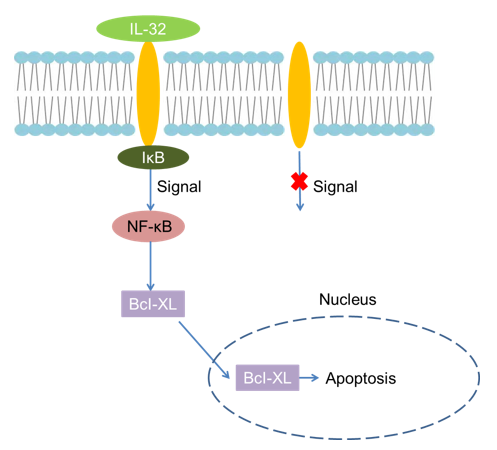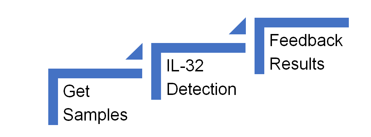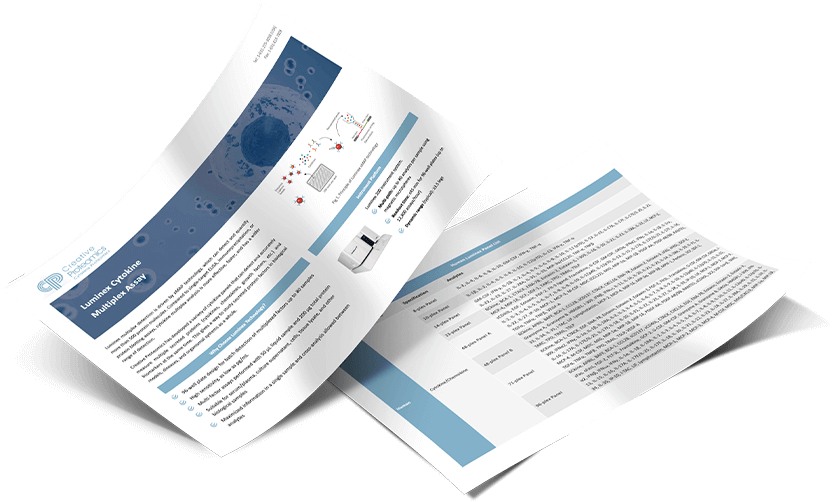Introduction
Interleukin 32, also known as natural killer factor 4, is a class of cytokines containing multiple splice variants, which is closely related to many inflammatory and autoimmune diseases. IL-32 is mainly produced by natural killer cells, T cells, epithelial cells, and monocytes in the surrounding blood. Interferon (IFN) -γ can strongly induce the production of IL-32 in epithelial cells and monocytes. There are many splicing variants of IL-32. Its main biological characteristics include the induction of inflammatory cytokines, the promotion of inflammatory mediator release, and the regulation of the normal function of natural killer cells. Studies have shown that IL-32 exhibits the characteristics of pro-inflammatory factors, can promote the secretion of multiple inflammatory factors such as IL-6, IL-1β, TNF-α, and has a cascade amplification effect. In addition, IL-32 is closely related to inflammatory diseases such as rheumatoid arthritis (RA), Crohn disease, tuberculosis, acquired immune deficiency syndrome, and the expression of IL-32 is also related to the rate of red blood cell sedimentation.
Mechanism and Function
IL-32 is a newly discovered inflammatory factor, which was first cloned from natural killer cells. The human IL-32 gene is located on chromosome 16p13.3. At present, nine splice variants such as IL-32α, IL-32β, and IL-32γ have been found. The role of IL-32 in tumors is currently controversial, and may vary depending on the type of tumor and the various subtypes of IL-32. The study found that the expression of IL-32 in tumors such as gastric cancer, pancreatic cancer and renal cancer was significantly higher than that of normal people, which may be considered as an independent prognostic factor for the above tumors. IL-32 can affect the expression of anti-apoptotic proteins BcI-2, BcI-xL and McI-1. Paracrine inhibition of anti-tumor immunity may be its main mechanism of action. In hematological malignancies, stromal cells of patients with myelodysplastic syndrome overexpress IL-32 mRNA, and exposure of stromal cells to IL-32 can induce the production of TNF-α. Using siRNA to knock out IL- 32 can significantly down-regulate cytokines such as IL-6, MCP-1, RANTES. However, studies have shown that IL-32 can exert antitumor effects. For example, IL-32 can promote human cervical cancer cells to undergo apoptosis. IL-32β can increase the number of cytotoxic T lymphocytes and exert antitumor effect. Overexpression of IL-32γ can inhibit the proliferation of colon cancer cells, and at the same time, the NF-κB and STAT3 signaling pathways are inhibited.
IL-32 binding enzyme 3 (PR3) has high affinity and cannot be inhibited by enzymes, and is one of the receptors of IL-32. PR3 is a neutrophil serine protease and exists in a soluble or thin film form. PR3 is a specific IL-32α binding protein and does not depend on enzyme activity. Increasing the activity of cytokines by PR3 can limit the division of IL-32α. Therefore, treatment of IL-32 by specific inhibition of PR3 activity or neutralization of IL-32 by inactive PR3 can reduce the consequences of the effects of IL-32 in immunomodulatory diseases. It may be a good strategy to combat PR3 enzyme activity and select PR3 through enzyme inactivation to block IL-32 in the diseases in which IL-32 is involved.
At present, the specific action of IL-32 is unclear, and its receptors include protease 3 (PR3), integrin. By binding to its receptor, IL-32 may function through the following pathways. First, it inhibits intracellular NF-κB inhibitor protein IκB and activates the NF-κB pathway. Second, the p38MAPK pathway is activated. Third, relying on the caspase-1 pathway and other biological functions, it can induce T cell apoptosis, damage the immune monitoring function of NK cells, and induce monocytes to differentiate into macrophage-like cells.
 Fig 1. Mechanism of Signaling
Fig 1. Mechanism of Signaling
Creative Proteomics can provide cytokine detection platform for scientific research. According to different purposes, our dedicated analysts will customize exclusive solutions for you. We aim to provide customers with high-quality and convenient services to help you accelerate the progress of your project.
Our cytokine detection service includes but is not limited to:
- One or more cytokines qualitative and quantitative detection
- Cytokines qualitative and quantitative detection of various species
- Cytokine antibodies qualitative and quantitative detection
Sample requirements
- Sample Types-Blood, serum, plasma, cell culture medium, tissue homogenate, etc.
- Sample Volume - It is optimal for 50 samples. This volume allows for triplicate testing of each sample.
Our advantages:
- Different detection methods can be selected based on different samples and requirements.
- Ensure the specificity and accuracy of the test by using high quality antibodies.
- Repeat the test to ensure the repeatability and accuracy of the experimental results.
- Feedback results are accurate and efficient.
Technology platform:
We mainly provide the Luminex cytokine detection platform. Luminex uses fluorescently encoded microspheres with specific antibodies to different target molecules. The different microspheres can be combined freely to a certain extent so that up to 100 analytes can be tested multiple times simultaneously in a single experiment.
The Luminex cytokine assay platform has the following advantages:
- Multiple detection: simultaneous detection of 100 biological targets
- Short experiment time: 1-3 weeks
- High sensitivity: the lower limit of accurate quantification is as low as 0.1 pg/mL
- Save samples: only need a sample volume as low as 25 μL
- Time saving: the experiment process only takes 4 hours
For your different needs, we can also provide the following detection methods:
- Enzyme-linked immunosorbent assay (ELISA)
- Flow cytometry
Workflow

For more information about the IL-32 detection service or need other detection requirements, please contact us.
References:
- Kim, S.H., et al., Interleukin-32: a cytokine and inducer of TNFalpha. Immunity, 2005. 22(1):131-42.
- Felaco P, et al., IL-32: a newly-discovered proinflammatory cytokine. J Biol Regul Homeost Agents, 2009. 23(3): 141-7.

